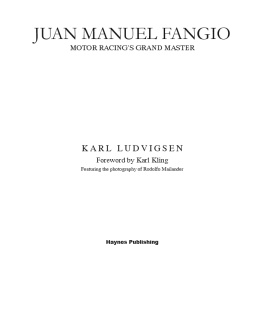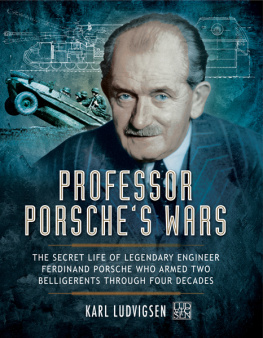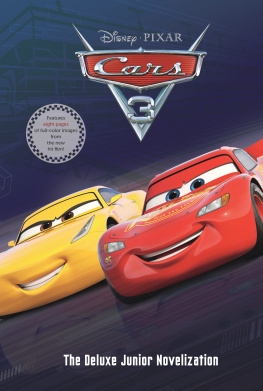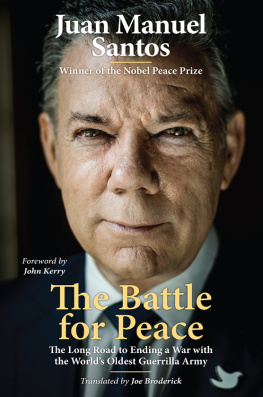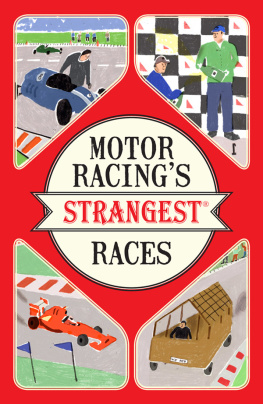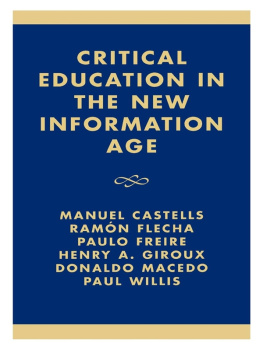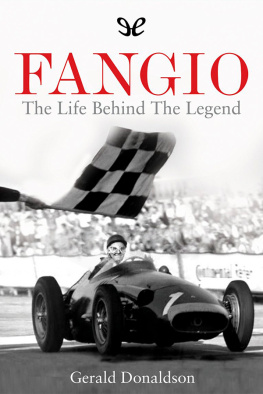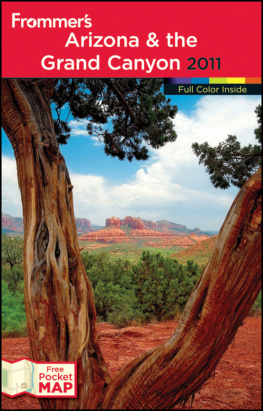Karl Ludvigsen - Juan Manuel Fangio: Motor Racings Grand Master
Here you can read online Karl Ludvigsen - Juan Manuel Fangio: Motor Racings Grand Master full text of the book (entire story) in english for free. Download pdf and epub, get meaning, cover and reviews about this ebook. genre: Detective and thriller. Description of the work, (preface) as well as reviews are available. Best literature library LitArk.com created for fans of good reading and offers a wide selection of genres:
Romance novel
Science fiction
Adventure
Detective
Science
History
Home and family
Prose
Art
Politics
Computer
Non-fiction
Religion
Business
Children
Humor
Choose a favorite category and find really read worthwhile books. Enjoy immersion in the world of imagination, feel the emotions of the characters or learn something new for yourself, make an fascinating discovery.
- Book:Juan Manuel Fangio: Motor Racings Grand Master
- Author:
- Genre:
- Rating:3 / 5
- Favourites:Add to favourites
- Your mark:
- 60
- 1
- 2
- 3
- 4
- 5
Juan Manuel Fangio: Motor Racings Grand Master: summary, description and annotation
We offer to read an annotation, description, summary or preface (depends on what the author of the book "Juan Manuel Fangio: Motor Racings Grand Master" wrote himself). If you haven't found the necessary information about the book — write in the comments, we will try to find it.
Karl Ludvigsen: author's other books
Who wrote Juan Manuel Fangio: Motor Racings Grand Master? Find out the surname, the name of the author of the book and a list of all author's works by series.
Juan Manuel Fangio: Motor Racings Grand Master — read online for free the complete book (whole text) full work
Below is the text of the book, divided by pages. System saving the place of the last page read, allows you to conveniently read the book "Juan Manuel Fangio: Motor Racings Grand Master" online for free, without having to search again every time where you left off. Put a bookmark, and you can go to the page where you finished reading at any time.
Font size:
Interval:
Bookmark:
1. 9
2. 15
3. 21
4. 27
5. 33
6. 39
7. 45
8. 51
How shall we measure the man? Shall we count up his 24 victories in the 51 qualifying Grand Prix races he entered in the first nine years of the world drivers championship? Shall we remind ourselves that he sat on pole in more than half of those races, 28 to be exact? And that only four other racing drivers - none still competing - have more poles to their credit? And that he set fastest lap in 23 of his championship Grands Prix? Of those still driving only Michael Schumacher has topped that total.
Juan Manuel Fangio took part in some 200 automobile races. The total would be much higher if you counted - as some do - the individual timed stages of the great South America open-road contests. Two hundred is not a massive total; Stirling Moss competed in more than twice as many. But Fangio aimed to drive the great cars in the great races and in this he succeeded admirably. Of those 200 races he won 78 and was placed in 69 more.
Yet it is with Formula 1 racing that Fangio is especially and indelibly associated. It is true that I always preferred Formula 1, he said. That was just a little bit because I liked to sit in the middle of the car. Then you achieve a consistent view to each side from which you can judge placing of the car in corners both to left and right By winning the world drivers championship in five of his eight full Formula 1 seasons he put down a marker that no other driver has yet approached.
One who might have, Ayrton Senna, admired Fangio as a man as well: What he did in his time is something that was an example of professionalism, of courage, of style and as a man, a human being. Every year, there is a winner of the championship but not necessarily a world champion. I think Fangio is the example of a true world champion
British fans, voting in 1998 for the best-ever Formula 1 driver 40 years after Juan Manuel last raced, agreed with Senna. They ranked Fangio first ahead of Jim Clark and Senna himself. In his lifetime Fangio was showered with awards from Germany, Italy, France and Argentina, where he was granted an honorary profes sorship. These he received with the grace, humility and modesty that characterised all his years.
Victory is satisfying, none can deny it he told his biographer Roberto Carozzo. However, after the garlands and the cheering crowds it is a relief to get away and forget all about motor racing. The day after-wards it all comes back, and you relive the race lap by lap, feeling thankful that you did your best and it was good enough
I also like another Fangio comment to Carozzo: Those who are too brave never make history because they dont know why they have won when they win. A really good driver should always know why he has won and why he has lost
Roberto Carozzos is the last, deepest and most personal book about Juan Fangio. I am fond of the first such book by Federico Kirbus and Ronald Hansen; my friend and colleague Kirbus was the intermediary for my personally autographed Fangio photo. Other books about Fangio have been written by Gnther Molter, Olivier Merlin, Stirling Moss with Doug Nye, and by Fangio in co-operation with his manager Marcello Giambertone.
Denis Jenkinsons book about the film Fangio has much to say. Of the film itself I am not so fond, although I am grateful to Chris Nixon for loaning it to me. I am grateful to these and the many other sources referenced in the Bibliography, especially the Auto Racing Analysis of Fangios career compiled by Steve Schuler.
A special pleasure in researching the life of Juan Fangio was rediscovering the snappy, evocative and styl-ish prose of Rodney Walkerley, sports editor of The Motor who wrote as Grande Vitesse. If you find him quoted often its because he brings the man and his races to vivid life.
I wish to express my gratitude to Paul Parker for editorial and research assistance, to Paola Arrighi and Maria Arizmendi, who helped me with interviews and translations, and most especially to Karl Kling for his open and great-hearted Foreword. Meeting and talk ing with Kling has been an honour and a pleasure. I am deeply indebted to my wife Annette for her encouragement of this project and to everyone at Haynes as well.
Luis Barragan and Alfredo Safe of the Fundacion Museo J. M. Fangio in Balcarce provided valuable help.
Magnificent assistance was rendered by Stanislav Peschel and Gerd Langer of the Daimler-Benz Classic Archive, Ermanno Cozza of Maserati and Riccardo Andreoni of Ferrari in providing photos and documen-tation. Donald Davidson helped with information on Fangios visit to Indy in 1958.
Among the photos from our archives those of Rodolfo Mailander stand out; without them this book would not have been possible. Peter Keens are superb as well. Other photographers well represented are Bernard Cahier, Louis Klementaski and Guy Griffiths. Many thanks to them all.
I took a snap or two myself in March 1954 when Fangio and Castellotti came to Thompson, Connecticut, of all places, to demonstrate a Maserati and a Siata for importer Tony Pompeo. My Spanish-speaking friend Stefan Habsburg introduced me to Fangio and helped me get his autograph.
Several years later in New York I was on hand, with a lady friend, when Fangio was present for the start of a rally. A comely blonde, she told me afterward that shed been a weak-kneed recipient of that blue-eyed Fangio gaze that won so many female conquests. His vision was excellent both on and off the track.
I would like to give his protege Juan Manuel Bordeu a few final words before I let Juan Manuels career speak for itself: Through Fangio I got a very striking insight into the human side of motor racing. I understood the natural gifts he had that enabled him to win. That tenacity, that pride, his physical toughness, his tremendous faith in himself. The wonderful thing about him is that this tenacity and will to win never blinded him or made him forget that motor racing has a human side.
He was so superior. I saw the difference between a good driver and a genius. He was a genius, a natural. He was not reserved about telling others how he did what he did. They just had to do it after he had done it.
German 2-litre sports car champion 1947-49 and Mercedes-Benz team driver 1951-55
When the name Fangio is mentioned, for me he was one of the greatest drivers of those days, and one of the most congenial and fair! A good colleague and a principled sportsman. Few were quite so fair as Fangio. I was in a position to experience that. Few were as open and aboveboard as Fangio was at that time.
In Argentina Juan Pern himself was a fan of motor sports. He provided a great deal of support for Fangio. After he took note of him in the beginning (Fangio had his own private Grand Premio Standard Chevrolet, which is what made him great in the first place) Pern recognised very early on that Fangio was a great talent, and supported him.
I came into contact with Fangio fairly frequently in the sport. Once, for example, I was faster than him at the Nrburgring. Fangio immediately moved aside. He didnt defend his position or anything like that. Twice at Monza I was faster than him at certain places - and he moved over. I cant say the same of many others.
Fangio remarked: We came up against each other a few times. Perhaps at such moments I had a bit better engine; that could well be. Purely from a driving standpoint he was better, thats all there was to it. Thats why I wont hear a word said against him. Thats why Im honest about him.
Font size:
Interval:
Bookmark:
Similar books «Juan Manuel Fangio: Motor Racings Grand Master»
Look at similar books to Juan Manuel Fangio: Motor Racings Grand Master. We have selected literature similar in name and meaning in the hope of providing readers with more options to find new, interesting, not yet read works.
Discussion, reviews of the book Juan Manuel Fangio: Motor Racings Grand Master and just readers' own opinions. Leave your comments, write what you think about the work, its meaning or the main characters. Specify what exactly you liked and what you didn't like, and why you think so.

